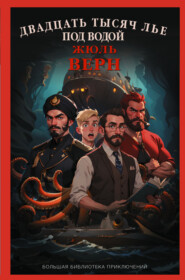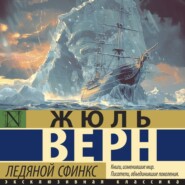По всем вопросам обращайтесь на: info@litportal.ru
(©) 2003-2024.
✖
The Voyages and Adventures of Captain Hatteras
Настройки чтения
Размер шрифта
Высота строк
Поля
"I saw him with my own eyes."
"And who is it?"
"It's a dog."
"A dog?"
"A four-footed dog?"
"Yes."
The surprise of the sailors of the Nautilus was great. Under any other circumstances they would have burst out laughing. A dog captain of a one hundred and seventy ton brig! It was certainly amusing enough. But the Forward was such an extraordinary ship, that one thought twice before laughing, and before contradicting it. Besides, Quartermaster Cornhill showed no signs of laughing.
"And Johnson showed you that new sort of captain, a dog?" he said to the young sailor. "And you saw him?"
"As plainly as I see you, with all respect."
"Well, what do you think of that?" asked the sailors, turning to Cornhill.
"I don't think anything," he answered curtly, "except that the Forward is a ship of the Devil, or of fools fit for Bedlam."
Without saying more, the sailors continued to gaze at the Forward, which was now almost ready to depart; and there was no one of them who presumed to say that Johnson, the boatswain, had been making fun of the young sailor.
This story of the dog had already spread through the city, and in the crowd of sight-seers there were many looking for the captain-dog, who were inclined to believe that he was some supernatural animal.
Besides, for many months the Forward had been attracting the public attention; the singularity of its build, the mystery which enshrouded it, the incognito maintained by the captain, the manner in which Richard Shandon received the proposition of superintending its outfit, the careful selection of the crew, its unknown destination, scarcely conjectured by any, – all combined to give this brig a reputation of something more than strangeness.
For a thoughtful, dreamy mind, for a philosopher, there is hardly anything more touching than the departure of a ship; the imagination is ready to follow her in her struggles with the waves, her contests with the winds, in her perilous course, which does not always end in port; and if only there is something unusual about her, the ship appears like something fantastic, even to the least imaginative minds.
So it was with the Forward. And if most of the spectators were unable to make the ingenious remarks of Quartermaster Cornhill, the rumors which had been prevailing for three months were enough to keep all the tongues of Liverpool busy.
The brig had been built at Birkenhead, a suburb of the city on the left bank of the Mersey, and connected with it by numerous ferry-boats.
The builders, Scott & Co., as skilful as any in England, had received from Richard Shandon careful plans and drawings, in which the tonnage, dimensions, and model of the brig were given with the utmost exactness. They bore proof of the work of an experienced sailor. Since Shandon had ample means at his command, the work began, and, in accordance with the orders of the unknown owner, proceeded rapidly.
Every care was taken to have the brig made exceedingly strong; it was evidently intended to withstand enormous pressure, for its ribs of teak, an East Indian wood remarkable for its solidity, were further strengthened by thick iron braces. The sailors used to ask why the hull of a ship, which was intended to be so strong, was not made of iron like other steamers. But they were told that the mysterious designer had his own reasons for having it built in that way.
Gradually the shape of the brig on the stocks could be clearly made out, and the strength and beauty of her model were clear to the eye of all competent judges. As the sailors of the Nautilus had said, her stem formed a right angle with the keel, and she carried, not a ram, but a steel cutter from the foundry of R. Hawthorn, of Newcastle. This metallic prow, glistening in the sun, gave a singular appearance to the brig, although there was nothing warlike about it. However, a sixteen-pound gun was placed on her forecastle; its carriage was so arranged that it could be pointed in any direction. The same thing can be said of the cannon as of her bows, neither were positively warlike.
On the 5th of February, 1860, this strange vessel was successfully launched in the sight of an immense number of spectators.
But if the brig was not a man-of-war, nor a merchant-vessel, nor a pleasure-yacht, for no one takes a pleasure trip with provisions for six years in the hold, what could she be?
A ship intended for the search of the Erebus and the Terror, and of Sir John Franklin? No; for in 1859, the previous year, Captain MacClintock had returned from the Arctic Ocean, with convincing proof of the loss of that ill-fated expedition.
Did the Forward want to try again the famous Northwest Passage? What for? Captain MacClure had discovered it in 1853, and his lieutenant, Cresswell, had the honor of first skirting the American continent from Behring Strait to Davis Strait.
It was nevertheless absolutely certain to all competent observers that the Forward was preparing for a voyage to icy regions. Was it going to push towards the South Pole, farther than the whaler Wedell, farther than Captain James Ross? But what was the use, and with what intention?
It is easy to see that, although the field for conjecture was very limited, the imagination could easily lose itself.
The day after the launching of the brig her machinery arrived from the foundry of R. Hawthorn at Newcastle.
The engine, of one hundred and twenty horse-power, with oscillating cylinders, took up but little space; its force was large for a vessel of one hundred and seventy tons, which carried a great deal of sail, and was, besides, remarkably swift. Of her speed the trial trips left no doubt, and even the boatswain, Johnson, had seen fit to express his opinion to the friend of Clifton in these terms, —
"When the Forward is under both steam and sail, she gets the most speed from her sails."
Clifton's friend had not understood this proposition, but he considered anything possible in a ship commanded by a dog.
After the engines had been placed on board, the stowage of provisions began; and that was no light task, for she carried enough for six years. They consisted of salted and dried meats, smoked fish, biscuit, and flour; mountains of coffee and tea were deposited in the store-room. Richard Shandon superintended the arrangement of this precious cargo with the air of a man who perfectly understood his business; everything was put in its place, labelled, and numbered with perfect precision; at the same time there was stowed away a large quantity of pemmican, an Indian preparation, which contains a great deal of nutriment in a small compass.
This sort of supply left no doubt as to the length of the cruise; but an experienced observer would have known at once that the Forward was to sail in polar waters, from the barrels of lime-juice, of lime lozenges, of bundles of mustard, sorrel, and of cochlearia, – in a word, from the abundance of powerful antiscorbutics, which are so necessary in journeys in the regions of the far north and south. Shandon had doubtless received word to take particular care about this part of the cargo, for he gave to it especial attention, as well as to the ship's medicine-chest.
If the armament of the vessel was small enough to calm the timid souls, on the other hand, the magazine was filled with enough powder to inspire some uneasiness. The single gun on the forecastle could not pretend to require so large a supply. This excited curiosity. There were, besides, enormous saws and strong machinery, such as levers, masses of lead, hand-saws, huge axes, etc., without counting a respectable number of blasting-cylinders, which might have blown up the Liverpool custom-house. All this was strange, if not alarming, not to mention the rockets, signals, lights, and lanterns of every sort.
Then, too, the numerous spectators on the quays of the New Prince's Docks gazed with admiration at a long mahogany whale-boat, a tin canoe covered with gutta-percha, and a number of halkett-boats, which are a sort of india-rubber cloaks, which can be inflated and thereby turned into canoes. Every one felt more and more puzzled, and even excited, for with the turn of the tide the Forward was to set sail for its unknown destination.
CHAPTER II
AN UNEXPECTED LETTER
This is a copy of the letter received by Richard Shandon eight months previously: —
ABERDEEN, August 2, 1859.
MR. RICHARD SHANDON, Liverpool.
SIR, – This letter is to advise you of a remittance of £16,000, deposited with Messrs. Marcuart & Co., bankers, at Liverpool. Enclosed you will find a series of drafts, signed by me, which will enable you to draw upon Messrs. Marcuart & Co. to the amount mentioned above.
You do not know me. No matter; I know you, and that is enough. I offer you the position of mate on board of the brig Forward, for a voyage which may be long and perilous.
If you decline, well and good. If you accept, five hundred pounds will be assigned you as salary, and at the end of each year of the voyage your pay will be increased one tenth.
The brig Forward does not exist. You will be obliged to have it built so that it will be possible to set to sea in the beginning of April, 1860, at the latest. Enclosed is a drawing with estimates. You will follow them exactly. The ship will be built in the stocks of Scott & Co., who will arrange everything with you.
I beg of you to be specially cautious in selecting the crew of the Forward; it will consist of a captain (myself), a mate (you), a second mate, a boatswain, two engineers, an ice-master, eight sailors, two stokers, in all eighteen men, including Dr. Clawbonny of this city, who will join you at the proper time.
Those who are shipped on board of the Forward must be Englishmen, independent, with no family ties, single and temperate; for the use of spirits, and even of beer, will be strictly forbidden on shipboard: the men must be ready to undertake and endure everything.
In your selection you will prefer those of a sanguine temperament, and so inclined to maintain a higher degree of animal heat.
You will offer the crew five times their usual pay, to be increased one tenth at the end of each year. At the end of the voyage each one shall receive five hundred pounds, and you yourself two thousand. The requisite sum shall be deposited with the above-named Messrs. Marcuart & Co.
The voyage will be long and difficult, but one sure to bring renown. You need not hesitate, then, Mr. Shandon.
Send your answer to the initials K. Z., at Gottenburg, Sweden, poste restante.
P. S. On the 15th of February[1 - The letter says the large Danish dog will arrive on the 15th of February. In chapter 3 the dog arrives on the 15th of March "as the captain's letter had said." Other versions have the same inconsistency.] next you will receive a large Danish dog, with hanging lips, of a dark tawny color, with black stripes running crosswise. You will find place for him on board, and you will feed him on barley bread mixed with a broth of lard. You will acknowledge the receipt of this dog by a letter to the same initials at Leghorn, Italy.

















